Unlock the Editor’s Digest for free
Roula Khalaf, Editor of the FT, selects her favourite stories in this weekly newsletter.
LVMH reported its weakest quarterly sales growth since the pandemic recovery supercharged luxury revenues at the start of 2021, as Chinese demand subsided and champagne sales fell.
The world’s largest luxury group said like-for-like sales in Asia excluding Japan — which is dominated by the Chinese market — declined 6 per cent in the first three months of the year. Revenues in the US and Europe grew 2 per cent, while sales in Japan increased 32 per cent, buoyed by the weak yen and an increase in Chinese tourist shopping.
LVMH has kicked off the luxury earnings season “with a softer start to the year, as widely expected by the market, due to the multiyear tough comparable basis and weak trends globally”, said Zuzanna Pusz, analyst at UBS.
The company, which is controlled by the family of billionaire Bernard Arnault, is viewed as a bellwether for the sector given its size and influence. While its growth has slowed in recent quarters, its performance remains resilient compared with that of rival Kering, which recently issued a rare profit warning for the sector because of weak sales in China at its biggest brand Gucci.
The luxury industry has been hit by a slowdown as a pandemic-era shopping boom comes to an end. Consultancy Bain expects the market for personal luxury goods to grow 1 to 4 per cent in 2024, down from an estimated 8 to 10 per cent in 2023.
LVMH shares rose by more than 2 per cent in morning trading on Wednesday.
Sales at the Paris-based group’s fashion and leather goods division — which includes Christian Dior and Louis Vuitton, two bellwethers for personal luxury goods — grew 2 per cent on an organic basis to €10.5bn in the first quarter.
The figures, in line with consensus expectations from analysts compiled by Visible Alpha, marked a sharp slowdown from the 18 per cent growth reported in the same period a year ago when China emerged from its strict Covid-19 lockdowns. The flagship division recorded a 9 per cent gain in sales in the fourth quarter of 2023.
Demand at LVMH’s biggest division by sales was still buoyed by Chinese customers both in their home market and overseas, with global sales to Chinese clientele up about 10 per cent — a slower pace than the post-lockdown euphoria of early 2023, but stronger than other big markets such as the US and Europe, where growth has been weak since last year.
At Louis Vuitton, the world’s biggest luxury brand with more than €20bn in annual revenues, US sales were roughly flat and those in Europe were “slightly negative” in the quarter, according to LVMH’s chief financial officer Jean-Jacques Guiony.
LVMH, which has a market value of €396bn, does not publish performance by brand but Guiony said global sales growth at top brands Dior and Louis Vuitton were “pretty clustered” around 2 per cent.
He added that the main change compared with the final quarter of last year was with Chinese customers, partly because “the base of comparison is much tougher . . . and second is that growth is normalising overall” in Asia’s biggest market.
Guiony also said that the group had hoped for “a very gradual improvement” in the US, with the return to stores of aspirational customers whose budgets have been squeezed as interest rates and inflation rise. “We think that we will gradually see improvement, but over several quarters, or even several years,” Guiony said. “It’s not going to be spectacular.”
Sales also fell year on year in the group’s watches and jewellery division. US-focused jeweller Tiffany, which LVMH bought for $16bn in 2020, had “suffered quite a bit from its exposure to aspirational American customers”, Guiony said.
Group sales at LVMH, which also includes Belmond hotels and cosmetics retailer Sephora, grew 3 per cent on an organic basis to €20.7bn, in line with consensus expectations. However, a 4 per cent negative currency effect mostly from the yen and the renminbi pulled the reported numbers into negative territory.
LVMH’s wines and spirits division was the weakest performer, with like-for-like sales falling 12 per cent in the first quarter, following declines at the end of last year as global demand for champagne fell. Hennessy cognac, which is also owned by the group, continued to have limited orders in the US, its biggest market, amid uncertainty among retailers about its outlook after a boom during the pandemic.

Robert Johnson is a UK-based business writer specializing in finance and entrepreneurship. With an eye for market trends and a keen interest in the corporate world, he offers readers valuable insights into business developments.








